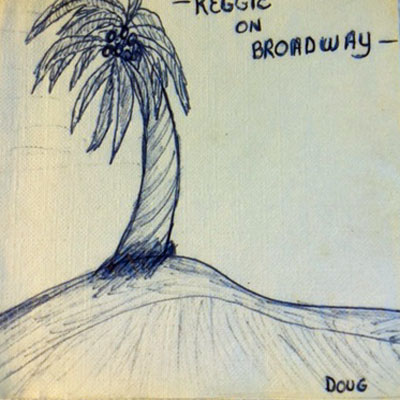[Click on BLUE LINKS for further information and sources]
It depends on what the meaning of “is” is. Bill Clinton
[Note: Make sure to read the last paragraph all the way to the bottom.]
Before I was a restaurateur, before I was a financial planner, before I was an old, retired man blogging pointlessly into cyberspace—I was an aspiring economist. That’s probably why I decided to write about a senseless question like “what is the economic impact of natural disasters?” Like, who cares? Anyone with a bit of common sense knows it isn’t good, right?

Sea Gull Cellar Bar Napkin Art, Sandra Lindstrom artist
I mean, really, what is the economic impact of a child losing a parent, or of a family losing the primary bread earner, or of losing a house, or of anyone who loses a friend or a neighbor, or of becoming disabled in an instant, or losing your livelihood? For anyone with a heart the impact should be obvious. But, economists are not known for their hearts. They are known for their nerdy calculations.
“… the age of chivalry is gone. That of sophists, economists, and calculators, has succeeded; and the glory of Europe is extinguished forever.” Edmund Burke, Reflections on the Revolution in France
Well, okay. Let’s not get so dramatic. The fact is that the “personal” impacts of natural disasters are not quantifiable. Enough said. But, what is the impact on the economy? In this case, the answer depends not only on what the meaning of “is” is but also on the meaning of “impact” and “economy.” With a little imagination, we might be able come up with some answers without the nerdy equations and without any numbers or graphs at all.

Sea Gull Cellar Bar Napkin Art, artist unknown
This is an informal discussion, not an economic treatise. It is for ordinary people, something even economists aspire to be sometimes.
If we are talking about the “local” economy in the immediate area of the disaster, the impacts can be large and long lasting. If we are talking about the impact on the “national’ economy, it is probably small. After all, in a multi-trillion dollar economy, a few billion dollars here or there is not such big deal in spite of the quip attributed to the entertaining Senator Dirksen whether or not he actually said it: “a billion here, a billion there, pretty soon your talking real money.” If we dial down to the most basic level, the impact of buildings and capital destroyed, businesses forced into bankruptcy, individuals forced into poverty—the impact could be huge—while the economic impact on an entire country may be minor unless the entire country is small and completely impacted such as the Caribbean islands after the recent hurricanes. This is the difference between microeconomics and macroeconomics.
“Hurricanes Harvey, Irma, and Maria have devastated many communities, inflicting severe hardship,” the FOMC said in its statement after two days of meetings this week. “Storm-related disruptions and rebuilding will affect economic activity in the near term, but past experience suggests that the storms are unlikely to materially alter the course of the national economy over the medium term.” [Source]

Sea Gull Cellar Bar Napkin Art, Doug artist
The most obvious loss, in economic terms, from a natural disaster is the destruction of capital, both tangible capital (buildings, bridges, roads, equipment, etc.) and human capital (the skills, talents, creativity, and knowledge of human beings). As already stated, this can be catastrophic even irreparable at the local level.
However, all may not be lost. Economists have a way of turning the worst disasters into cheery outcomes. Years ago an Austrian economist named Joseph Schumpeter coined the phrase “creative destruction.” Yes, you heard that right, destruction can be creative. While, in the short run, businesses and lives can be ruined, assets destroyed and lost, there may be a silver lining. Businessmen (like vultures) can (will?) come to the rescue and invest in new assets, upgrading and modernizing industry in ways that allow the economy to come back stronger and better. That is, in the short run the economy may suffer greatly but in the long run it may recover and even prosper.

Sea Gull Cellar Bar Napkin Art, Bob Avery artist
A disaster may lead to better planning, rules and regulations that reduce the impact of future natural calamities. Who knows, maybe this is nature’s way of pruning the dead wood. I know enough to be careful here of going down the road of the social Darwinists like Herbert Spencer. No more needs to be said.
The immediate loss of productive resources (infrastructure, capital) adversely impacts productivity but productivity can be spurred by an increase in cooperation, a desire for quick recovery, and help from the outside (both national and international). Unfortunately the long term benefits are often delayed and not concentrated in the areas affected. While emergency funds can be quickly dispersed, long term funding for rebuilding efforts must be appropriated by government bodies and may be forthcoming, if at all, only with a long lag.

Sea Gull Cellar Bar Napkin Art, Gordon artist
Investment guru Warren Buffett has been quoted as saying that natural disasters can have a greater economic impact than terrorism. (He is heavily invested in the insurance industry.) Given the way economic statistics are compiled, the losses may be understated and the gains overstated. Take, for example, a family that produced almost all of their needs at home before the disaster. The home “production” of their own food and clothing, etc. was probably not picked up in the measurement of the local economy and thus not measured as an economic loss due to the disaster. But, now mom and dad and maybe even the kids must work outside the home to put food on the table and clothes on the back this activity will surely be picked up in the national accounts and appear as “economic growth.” (Economists: look for the work of William Nordhaus and James Tobin.)
There is also a short term/long term difference. Growth rates are adversely affected in the short term because of the immediate disruption to local business. In the long term as the recovery efforts take hold the growth rate may increase. However, the jobs and incomes generated in the recovery period may not stay in the local economy. Outside contractors that specialize in the cleanup, rebuilding and renovation activities are often brought in and obtain the economic benefits.

Sea Gull Cellar Bar Napkin Art, Jack Haye artist
If the damage is severe it could take months or years for the local economy to recover if it recovers at all. The people living in the disaster area may recover faster if they move away and find better jobs and living conditions assuming they can afford to do so.
So, the “true” and “complete” economic impact of natural disasters is an unsettled matter. What is a settled matter is that the people whose lives and livelihoods are destroyed by a natural disaster need all the help they can get to literally dig themselves out from the rubble. And, we, as caring human beings, have an obligation to help them, personally and together through organizations, as much as we can.

Sea Gull Cellar Bar Napkin Art, Jack Haye artist
Even the economists can wax on about the potential benefits of pitching in to help one’s neighbor. And, if they sound too optimistic, well that’s better than throwing up your hands in despair.

Sea Gull Cellar Bar Napkin Art, artist unknown
“What has so often excited wonder [is] the great rapidity with which countries recover from a state of devastation; the disappearance, in a short time, of all traces of the mischiefs done by earthquakes, floods, hurricanes, and the ravages of war.”
—John Stuart Mill

Sea Gull Cellar Bar Napkin Art, Doug, DED, and Rich artists
Of course, any optimistic assessment of economic impacts implicitly assumes that the natural disaster is not catastrophic over an enormous area. For example, a meteorite plunging into the earth would probably end life as we know it for a very long time if not forever. Or, as we say in California, the Really Big One will come someday. Have a plan even if you think the risk is low in the short run. A carefully constructed plan could make all the difference.


Good Thinking …
Thank you .
M
PRETTY THOUGHT PROVOKING PIECE FOR AN “old, retired man blogging pointlessly.
SUSAN